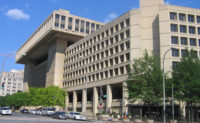Federal Bureau of Investigation and General Services Administration officials faced sharp questioning on Capitol Hill as they defended a Trump administration proposal to replace the FBI’s aging downtown Washington, D.C., headquarters with a new building at the same spot.
Testifying at a Feb. 28 Senate Environment and Public Works Committee hearing, GSA public buildings Commissioner Daniel Mathews said the lack of full funding was one reason for the sudden 2017 cancellation of a $1.4-billion plan to move the FBI’s main building to a suburban Maryland or Virginia campus. He said uncertainties about the planned transfer of the J. Edgar Hoover Building site to the District of Columbia for future development “greatly complicated and increased the risk of the procurement.”
Without congressional approval of the remaining $882 million needed for the headquarters transfer, Mathews said, officials couldn’t determine when the new building would be done, the FBI would move and the site would be turned over to a developer. GSA found that financial, legal and operating risks were “simply too great to proceed without full funding for such a contract” and canceled the procurement, he said.
Richard Haley, assistant director of the FBI’s finance division, said the cancellation allowed the bureau to reassess real estate aspects of its scope and mission. Transferring approximately 2,300 workers to four other FBI-owned locations would cut headquarters personnel requirements to 8,300, he said.
The fact that the federally owned site has no need for a new mechanical plant or truck-inspection facility helped further pare space requirements by about half, to 2.65 million gross sq ft. Thus, Haley and Mathews said, the new program could be finished in six years for about $3.3 billion, compared with the now-estimated $3.6 billion for the suburban plan. Mathews said the schedule would be possible only with a full construction authorization of $2.2 billion, a move the new Bipartisan Budget Act permits.
Senators Ben Cardin and Chris Van Hollen, Maryland Democrats, weren’t satisfied. They pressed Mathews and Haley about apparent reversals to previous concerns about the downtown site, including the lack of a 300-ft building setback for security purposes. Mathews said that while the D.C. site has limitations, it could be appropriately secured “with the right construction protections.”
Mathews and Haley declined to respond to senators’ repeated queries about whether they were aware of any involvement in the decision by President Trump, who would likely benefit financially from not having a new commercial property across from the Trump International Hotel on Pennsylvania Avenue. They insisted the decision to change course was driven solely by their two agencies.
Committee Chairman John Barrasso (R-Wyo.) also faulted the agencies for extending an already protracted timetable to replace a building “long overdue” for replacement. “The federal government has already spent over $20 million and 13 years planning for an FBI headquarters,” Barrasso said. “The revised plan starts the process from scratch.”
The project’s saga won’t end soon. It’s up to Congress to approve and fund the plan. And Rep. Gerry Connolly (D-Va.) has asked GSA’s inspector general to investigate the administration’s decision.





Post a comment to this article
Report Abusive Comment